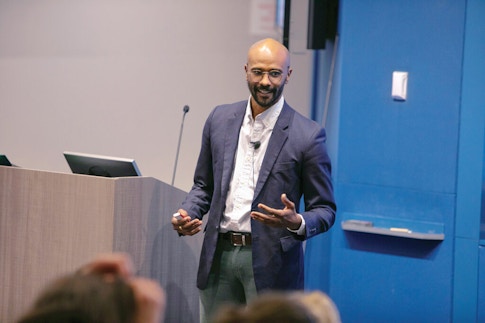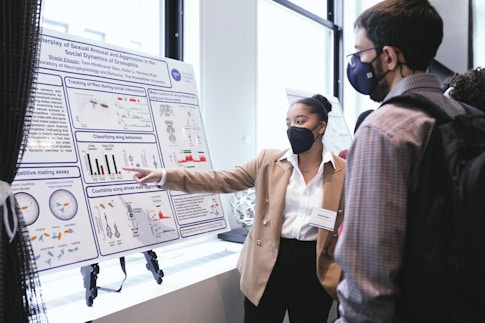Strengthening Science Through Diversity

The mission of the Simons Foundation is to advance the frontiers of basic science. Doing so necessitates drawing on all potential sources of talent. We therefore aim to significantly increase the number of students from underrepresented backgrounds who earn doctorates in basic science, and to enhance the diversity and culture of our own workplace.
In 2021, under the leadership of Co-Chairs Marilyn and Jim Simons and President David Spergel, a Diversity, Equity and Inclusion (DEI) framework and action plan was presented to our board of trustees. This framework focuses on increasing DEI in our workforce, in our workplace, in our grantmaking and in our outreach programs.
This work was informed by significant efforts, beginning in 2020, that led to the creation of a dedicated DEI office. The office is led by Craig Wesley who, with DEI associate Dominique Harrison, coordinates diversity efforts across the organization. Our framework was also informed by extensive staff engagement including consultation with a steering committee and working groups, and by conversations with other science-focused organizations.
Throughout 2021, we began developing new foundation grant programs to improve diversity in science. The Simons Collaboration on the Global Brain launched two diversity initiatives, the Transition to Independence fellowships and the Undergraduate Research Fellowship (SURF) Program. The goal of SURF is to spark and sustain interest in systems and computational neuroscience among undergraduate students from diverse backgrounds underrepresented in neuroscience research. The program’s inaugural class included 29 fellows.
SFARI’s SPARK initiative launched its SPARK Research Match Diversity, Equity and Inclusivity request for applications to address historic disparities in research participation by Black or African American individuals. A DEI manager, Jibrielle Polite, was hired to help lead this work.

The Flatiron Institute hosted its first visiting Inclusion, Diversity, Equity & Advocacy (IDEA) scholar, Stephon Alexander, a theoretical physicist from Brown University, in 2020, and in 2021, Karín Menéndez-Delmestre, an astronomy professor at the Valongo Observatory of the Federal University of Rio de Janeiro in Brazil, came onboard. IDEA scholars are distinguished scientists who have strong scientific overlap with one or more Flatiron computational centers and a particular interest in increasing diversity and improving equity and inclusion within science. Menéndez-Delmestre leads a group of students and postdoctoral fellows in extragalactic astronomical research, and Alexander was instrumental in setting up the Simons-NSBP program.
In the coming years, the foundation intends to expand grant programs and mentorship at all stages of the STEM pathway and increase our engagement with organizations that serve diverse communities. As an organization based in New York City, we have a tremendous opportunity to help create an inclusive STEM ecosystem locally that will significantly increase the number of Black and Latine students who earn doctorates in fields where the Simons Foundation is active. The foundation is now invested in citywide programs that support an accessible STEM pathway from K-12 education through postdoctoral and early-career science, tracking diverse students’ success and assisting them in moving to the next stage. It is our hope that this model will work and, eventually, scale up to have even greater impact.
In regard to our own staff and workplace, we are striving to establish a culture of inclusion and belonging at the foundation. We have created employee resource groups for Black, Asian American and Pacific Islander, and Latine employees, and also for women, LGBTQ+ people and caregivers in our workforce. We will develop our leaders’ and managers’ DEI knowledge and capacities through professional development, training on inclusive hiring practices and support for open communication.
Diversifying science and our organization will require a long-term commitment, but one that will enhance our ability to advance our mission. We intend to hold ourselves accountable for achieving this, and will report progress on an annual basis to our board of trustees.
This article first appeared in the Simons Foundation 2021 Annual Report.
For a complete list of projects funded by the foundation, please visit our DEI Supported Projects page.


